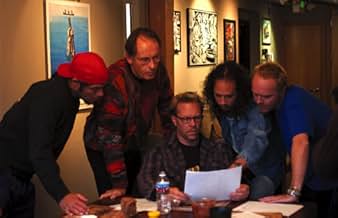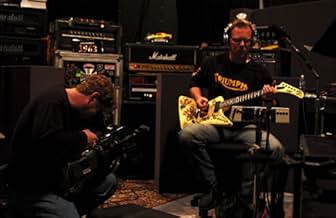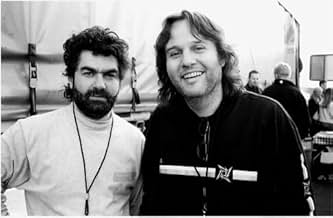The iconic metal band struggles for two years to create their album St. Anger, dealing with alcoholism, the loss of their bass player, and the challenge of working with a psychotherapist.The iconic metal band struggles for two years to create their album St. Anger, dealing with alcoholism, the loss of their bass player, and the challenge of working with a psychotherapist.The iconic metal band struggles for two years to create their album St. Anger, dealing with alcoholism, the loss of their bass player, and the challenge of working with a psychotherapist.
- Awards
- 6 wins & 4 nominations total
Cliff Burton
- Self
- (archive footage)
Steffan Chirazi
- Self
- (as Stefan Chirazi)
Featured reviews
I am a huge fan of early Metallica. They lost me, though, on the Metallica album (the black album, the first sign that they were turning into Spinal Tap). While this documentary is great film, I have to say that it just makes clear that Lars and James are utterly devoid of humor when it comes to themselves. At the film festival screening the theatre was filled with laughter as they revealed themselves to be petulant children who have a long way to go to reach maturity. Poor Kirk and the new guy, Rob Trujillo. There were only two times when Lars spoke really honestly in a way that didn't seem manipulative, and James never gave up anything real except when he was with his kids. The $40,000 a month counselor (he is not a trained psychiatrist or psychologist) was right out of Spinal Tap. FYI- the biggest cheers erupted after every Jason Newsted interview because he is just straight up, real, and honest. I wish him a lot of success because he seems to truly be all about playing music. Believe me, I applaud Metallica for being willing to let people see this truly great film, but as for Lars and James, lighten up for crying out loud. Therapy isn't only about expressing your feelings and expecting everyone to pat you on the back, it's also about learning to admit when you're wrong or being a jerk and laughing at yourself.
10Jeddia
This is probably the first documentary about Metallica that didn't make you feel good. All of the older documentaries show a band that was personable and fun-loving, rocking like no one else can. They showed us the Metallica we were proud to call ourselves fans of. But with Some Kind of Monster , we see a band full of weather-beaten rock stars, burned out (an understatement), tired, desperate, and aggravated. It broke my heart to watch this, but it was a damn fine documentary.
Frankly, I'm glad this was released. Because the average semi-informed fan of Metallica (like myself), has only seen the headlines over the past ten years - which served to make the band look like they were becoming complete pricks. I love Metallica. But the wall of negative stuff that was thrown at us in the past decade has tainted our view of the band. This documentary straightens some of it out. While I don't believe that was the goal of the film, it is a fortunate side-effect.
I know the Metallica of the 80's is gone - beer flying, 9-minute epic metal songs, and the long hair - but hopefully, our favorite rockers still have the fire within to bring us a few more great albums. Metallica showed the world that heavy metal (and I mean *heavy*) didn't have to use gimmicks and make-up to be mainstream. All it needed was the right attitude and talented musicians to play it. I've seen them live nearly 20 times. Nobody can do it like Metallica. Nobody.
Frankly, I'm glad this was released. Because the average semi-informed fan of Metallica (like myself), has only seen the headlines over the past ten years - which served to make the band look like they were becoming complete pricks. I love Metallica. But the wall of negative stuff that was thrown at us in the past decade has tainted our view of the band. This documentary straightens some of it out. While I don't believe that was the goal of the film, it is a fortunate side-effect.
I know the Metallica of the 80's is gone - beer flying, 9-minute epic metal songs, and the long hair - but hopefully, our favorite rockers still have the fire within to bring us a few more great albums. Metallica showed the world that heavy metal (and I mean *heavy*) didn't have to use gimmicks and make-up to be mainstream. All it needed was the right attitude and talented musicians to play it. I've seen them live nearly 20 times. Nobody can do it like Metallica. Nobody.
In 2001, the most successful Metal outfit of all time are teetering on the brink of a creative and personal s**tpit. Longtime bassist Jason Newstead has just quit, relations between the band are at an all-time low and, under pressure to deliver their first studio album of original material in years, 'St. Anger', the group have hired a therapist to help pull their plectrums out of their asses. What better time or what worse to invite the cameras round? For the next three years? Therapy, one feels, has gone to their heads. Even if you loathe Heavy Metal (especially if you loathe Heavy Metal) there's loads to enjoy here: from Oasis to Spinal Tap, everyone loves rock stars having a ruck, and Metallica rarely disappoint. Wince! As drummer Lars screams in singer James' face ('All these rules?! This is supposed to be a rock 'n' roll; band!!'). Gape! As they ponder whether 'guitar solos are outdated'. Boggle! As Lars' funky Danish dad Torben, resplendent in a long white beard and druid's staff, like something out of Tolkien, informs his son that their new music 'doesn't cut it'. Guffaw! As their therapist, resplendent in an ever-expanding range of lurid pullovers (so that's where his massive salary's going) nods politely along throughout, like a disco dad.
The debate over whether or not Michael Moore's `Fahrenheit 9/11' should be called a `documentary' won't be heard hovering around Joe Berlinger and Bruce Sinofsky's (`Brother's Keeper,' `Paradise Lost') `Metallica: Some Kind of Monster' because it is a documentary, an accurate rendering of the rock group's long struggle to create its latest album, `St. Anger.' Although sex and drugs play no role in the film and the groupie adulation is almost non present, making even the most out-of touch viewer skeptical, the battle of frontman James Hetfield with alcohol and the group with dysfunction has the feel of authenticity. We are left with a business partnership reviving its product.
By engaging `performance-enhancement coach' Phil Towle for $40,000 a month, Metallica puts its money where its mouth is-a serious effort to preserve the magic of a group that sold 90 million albums, so much a product of delicate personality bonding that the full time therapist had a real challenge to preserve the indefinable chemistry. Beside Hetfield's demons, drummer Lars Ulrich's Napster battle takes energy from the group, so Towle is probably a small investment in its survival. If heavy metal is not your thing, seeing this group psychodrama would be worth the admission.
Not seeming to fit the overall clinical activity of the film is a scene of Ulrich selling his art collection. Critic Ed Gonzalez gives an insightful explanation:
`There's a moment in the film where Berlinger and Sinofsky force a fascinating correlation between the paintings that hang in Ulrich's home and the music the band makes, calling attention to the relationship between art and the spectator and the way that art is consumed. This scene has absolutely nothing to do with the psych sessions between Metallica and Towle, and it's a great one.'
This kind of organic unity makes it a documentary of artful proportions. I still prefer classical and folk music, but I have to admit to a new interest in a musical genre I can share with my musician grandson Cody.
By engaging `performance-enhancement coach' Phil Towle for $40,000 a month, Metallica puts its money where its mouth is-a serious effort to preserve the magic of a group that sold 90 million albums, so much a product of delicate personality bonding that the full time therapist had a real challenge to preserve the indefinable chemistry. Beside Hetfield's demons, drummer Lars Ulrich's Napster battle takes energy from the group, so Towle is probably a small investment in its survival. If heavy metal is not your thing, seeing this group psychodrama would be worth the admission.
Not seeming to fit the overall clinical activity of the film is a scene of Ulrich selling his art collection. Critic Ed Gonzalez gives an insightful explanation:
`There's a moment in the film where Berlinger and Sinofsky force a fascinating correlation between the paintings that hang in Ulrich's home and the music the band makes, calling attention to the relationship between art and the spectator and the way that art is consumed. This scene has absolutely nothing to do with the psych sessions between Metallica and Towle, and it's a great one.'
This kind of organic unity makes it a documentary of artful proportions. I still prefer classical and folk music, but I have to admit to a new interest in a musical genre I can share with my musician grandson Cody.
I saw this film at the True/False Film Festival in Columbia, Missouri, and was fortunate enough to hear some Q&A from the director after.
The two words that best describe Some Kind of Monster are "brutally honest." This is a no-holds-barred look at a band that has played together for two decades and is on the verge of disintegration from internal conflict, external pressures and creative stagnation. We see the members of Metallica not as icons, but as flawed individuals in a close, but often tumultuous relationship that has lasted longer than many marriages. At a fundamental level the seem to love each other, but as with many long-term relationships, they sometimes reach the point that they cannot stand the sight of one another.
Can they survive? Well, the mystery is obviously abated by knowing how the story ends (the production of the album St. Anger and the subsequent tour); but it in no way detracts from this interesting examination of the process of separation and reconciliation.
Central to the story is not only tension the band members experience in once again trying to bottle the lightning of musical success, but the fundamental changes taking place in James Hetfield's life as he enters rehabilitation for drug and alcohol addiction. While Hetfield's personal battle takes place off-screen, we see the powerful impact it is having on the rest of the group.
Some truly standout moments include the interaction between Lars Ulrich and his father Torben (an amusing and brutally honest character); the long-delayed meeting between Lars and Dave Mustaine (who was kicked out of the band in the early 80s and went on to found Megadeath); a long band meeting which consists mainly of screaming obscenities; the band's search for a new bassist; and the almost surreal scene of Hetfield attending his daughter's ballet recital.
If you wish to see the members of Metallica as icons, then Some Kind of Monster is probably not for you; however, if you would like an up-close view of them as very real human beings, then I highly recommend this film. Love them or hate them, you will bring something away from Some Kind of Monster.
The two words that best describe Some Kind of Monster are "brutally honest." This is a no-holds-barred look at a band that has played together for two decades and is on the verge of disintegration from internal conflict, external pressures and creative stagnation. We see the members of Metallica not as icons, but as flawed individuals in a close, but often tumultuous relationship that has lasted longer than many marriages. At a fundamental level the seem to love each other, but as with many long-term relationships, they sometimes reach the point that they cannot stand the sight of one another.
Can they survive? Well, the mystery is obviously abated by knowing how the story ends (the production of the album St. Anger and the subsequent tour); but it in no way detracts from this interesting examination of the process of separation and reconciliation.
Central to the story is not only tension the band members experience in once again trying to bottle the lightning of musical success, but the fundamental changes taking place in James Hetfield's life as he enters rehabilitation for drug and alcohol addiction. While Hetfield's personal battle takes place off-screen, we see the powerful impact it is having on the rest of the group.
Some truly standout moments include the interaction between Lars Ulrich and his father Torben (an amusing and brutally honest character); the long-delayed meeting between Lars and Dave Mustaine (who was kicked out of the band in the early 80s and went on to found Megadeath); a long band meeting which consists mainly of screaming obscenities; the band's search for a new bassist; and the almost surreal scene of Hetfield attending his daughter's ballet recital.
If you wish to see the members of Metallica as icons, then Some Kind of Monster is probably not for you; however, if you would like an up-close view of them as very real human beings, then I highly recommend this film. Love them or hate them, you will bring something away from Some Kind of Monster.
Did you know
- TriviaAll the footage for the film was comprised of 1600 hours of footage and was cut down to 2 Hours and 20 minutes.
- Quotes
[Metallica is asked to record a radio promo]
Lars Ulrich: Hey it's Lars from Metallica. I'm about to stick 50 grand up your ass...
James Hetfield: ...One dollar at a time.
- ConnectionsEdited from MTV News (1989)
- SoundtracksFrantic
Performed by Metallica
Written by James Hetfield (as Hetfield), Lars Ulrich (as Ulrich), Kirk Hammett (as Hammett),
Bob Rock (as Rock)
Courtesy of Elektra Entertainment Group
By Arrangement with Warner Strategic Marketing
Published by Creeping Death Music (ASCAP) and EMI Blackwood Music (Canada) Ltd./Mahina Hoku Publishing (SOCAN),
© 2003
- How long is Metallica: Some Kind of Monster?Powered by Alexa
Details
- Release date
- Country of origin
- Official site
- Language
- Also known as
- 金屬製品樂團:異種怪獸
- Filming locations
- Production companies
- See more company credits at IMDbPro
Box office
- Gross US & Canada
- $1,222,708
- Opening weekend US & Canada
- $46,359
- Jul 11, 2004
- Gross worldwide
- $1,980,444
- Runtime
- 2h 21m(141 min)
- Color
- Sound mix
- Aspect ratio
- 1.33 : 1
Contribute to this page
Suggest an edit or add missing content


















